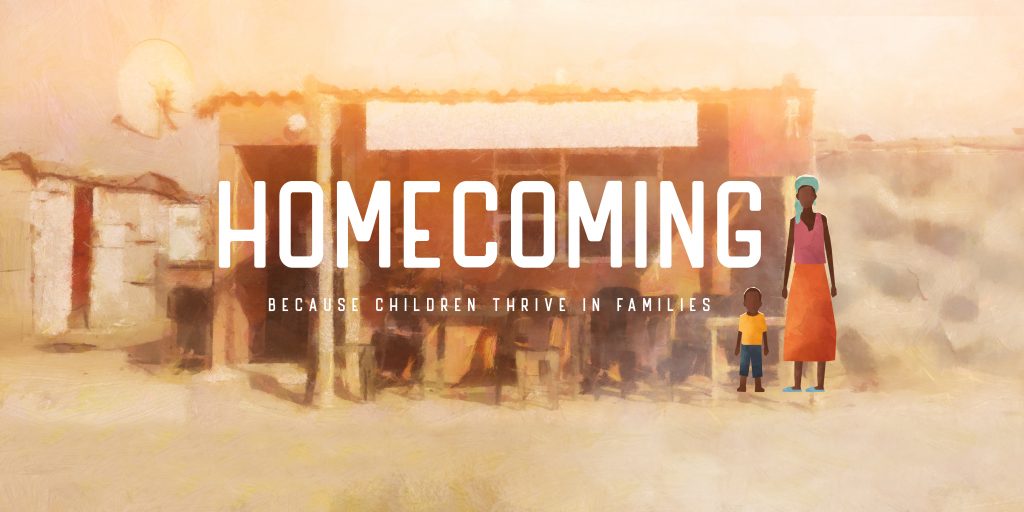A new project launches today, encouraging Christians in the UK to help the 8 million children in orphanages to come home to families.
In response to a ComRes poll of 6,000 British adults, which found that churchgoers are seven times more likely to visit or volunteer in orphanages than other adults, the Homecoming project is launching to raise awareness of the global orphanage crisis and encourage Christians to transition their support towards family-based alternatives.
It is estimated that 80% of the children living in orphanages have a living parent; they are not bereaved but have been driven into institutions against a backdrop of poverty. Following a commitment made by the UK Government to end its support for institutional care settings overseas and to implement a long-term plan to transition such support towards family-based alternatives, Christians are now being called on to do the same.
The Homecoming project is encouraging Christians to promote the same standard of family-based forms of care for children overseas. Hope and Homes for Children are delighted to support the project, which is being powered by the UK-based fostering and adoption charity, Home for Good. Other global experts in the field of deinstitutionalisation—the practice of helping children leave institutional care and rejoin families—are also supporting the initiative, including Save the Children, the Better Care Network and UNICEF.
Individuals and churches are being encouraged to support projects that enable children to come home to families—either through family strengthening, reunification with their birth family or through local fostering or adoption. The Founding Director of Home for Good, Dr Krish Kandiah said, “As a foster carer and adopter myself, I know that every child needs the love and care of a family. Through the work of Home for Good, we are seeing Christians stepping up to meet the needs of vulnerable children by becoming foster carers and adopters for UK children. So now we are asking people to have the same ambition for the vulnerable children that we are supporting overseas. They too need the love of a family rather than settling for living in institutions. If orphanages are not good enough for our kids, they’re not good enough for any child.”
The UK and other western nations no longer use orphanage care in recognition of the detrimental effect it has on the physical, social and emotional development of children.
“As a foster carer and adopter myself, I know that every child needs the love and care of a family… Christians [are] stepping up to meet the needs of vulnerable children by becoming foster carers and adopters for UK children. So now we are asking people to have the same ambition for the vulnerable children that we are supporting overseas.”
In one Russian study, one in three care leavers from an orphanage went on to become homeless, one in five gained a criminal record and one in ten took their own life. Over 80 years of research into child development has shown that an institutional setting is unable to replace a loving and attentive family.
Krish believes that the Christian community can be part of the solution to finding families for children who need them, arguing “Our research has found that churchgoers are seven times more likely to visit or volunteer in orphanages and around 44% have given money to orphanages in the last year—this makes UK Christians significant supporters of orphanages. However, we also know that they are more likely to give to great forms of care for vulnerable children and are more likely to support community or family-based projects too. So, we want to cheer the Church on to keep living out our biblical mandate to care for the vulnerable but also equip Christians to ensure their support is never misdirected to forms of care that do more harm than good.”
Our own experience at Hope and Homes for Children, plus that of other experts, reveals that western support—while well intentioned—can unwittingly be fuelling the global orphanage industry. The practical, financial and voluntary support is actually doing more harm than good.
“I have been told by government officials in Ukraine and workers on the ground in Uganda that empty beds in orphanages are considered a problem… Essentially the orphanage becomes a monster that needed feeding because there are staff salaries to pay and facilities to maintain”
Krish explained that, “It seems that many of the world’s orphanages rely on children staying put in order to receive the maximum funding. I have been told by government officials in Ukraine and workers on the ground in Uganda that empty beds in orphanages are considered a problem; orphanage workers actively go and recruit new children to fill them. Essentially the orphanage becomes a monster that needed feeding because there are staff salaries to pay and facilities to maintain, and empty beds mean less money to keep the institution going.”
Commenting on this new initiative, our Chief Executive Mark Waddington fully endorsed it by saying “Home for Good is one of the most important organisations. Why? Because it believes in family in all its forms. The community of churches that Home for Good works with will be breaking new ground with this campaign because of their belief that family is what children need to grow and develop.”
Find out more about the initiative by visiting homecomingproject.org
We’ve also put together a resource for churches wishing to find out more, particularly in response to Krish’s recent article for Premier Christianity magazine, at hopeandhomes.org/christianity
